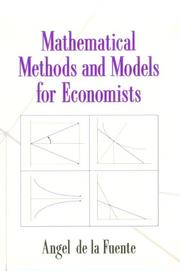| Listing 1 - 3 of 3 |
Sort by
|

ISBN: 9780521585293 9780521585125 0521585295 0521585120 1139641239 051181075X 1139648845 Year: 2000 Publisher: Cambridge Cambridge University Press
Abstract | Keywords | Export | Availability | Bookmark
 Loading...
Loading...Choose an application
- Reference Manager
- EndNote
- RefWorks (Direct export to RefWorks)
This book is intended as a textbook for a first-year PhD course in mathematics for economists and as a reference for graduate students in economics. It provides a self-contained, rigorous treatment of most of the concepts and techniques required to follow the standard first-year theory sequence in micro and macroeconomics. The topics covered include an introduction to analysis in metric spaces, differential calculus, comparative statics, convexity, static optimization, dynamical systems and dynamic optimization. The book includes a large number of applications to standard economic models and over two hundred fully worked-out problems.
Economics, Mathematical --- Economics --- Mathematical models. --- Mathématiques économiques --- Economie politique --- Modèles mathématiques --- Statistical methods. --- Méthodes statistiques --- -Mathematical models --- 330.0151 --- Models, Mathematical --- Business, Economy and Management --- Mathematical models --- 303.0 --- 330.3 --- AA / International- internationaal --- 519.2 --- 519.86 --- Simulation methods --- 519.86 Theory of economic-mathematical models --- Theory of economic-mathematical models --- 519.2 Probability. Mathematical statistics --- Probability. Mathematical statistics --- Economic statistics --- Econometrics --- Statistical methods --- Statistische technieken in econometrie. Wiskundige statistiek (algemene werken en handboeken) --- Methode in staathuishoudkunde. Statische, dynamische economie. Modellen. Experimental economics --- Quantitative methods (economics) --- wiskundige functies --- wiskundige statistiek --- mathematische modellen, toegepast op economie --- Economics - Statistical methods
Article
Abstract | Keywords | Export | Availability | Bookmark
 Loading...
Loading...Choose an application
- Reference Manager
- EndNote
- RefWorks (Direct export to RefWorks)
We construct a revised version of the Barro and Lee (1996) data set for a sample of OECD countries using previously unexploited sources and following a heuristic approach to obtain plausible time profiles for attainment levels by removing sharp breaks in the data that seem to reflect changes in classification criteria. It is then shown that these revised data perform much better than the Barro and Lee (1996) or Nehru et al. (1995) series in a number of growth specifications. We interpret these results as an indication that poor data quality may be behind counterintuitive findings in the recent literature on the (lack of) relationship between educational investment and growth. Using our preferred empirical specification, we also show that the contribution of TFP to cross-country productivity differentials is substantial and that its importance relative to differences in factor stocks increases over time ...
Book
ISBN: 9289445661 Year: 2003 Publisher: Luxembourg : Office des publications officielles des communautés européennes = Office for official publications of the European communities = OPOCE,
Abstract | Keywords | Export | Availability | Bookmark
 Loading...
Loading...Choose an application
- Reference Manager
- EndNote
- RefWorks (Direct export to RefWorks)
Human capital --- Ressources humaines --- POLITIQUE DE L'EMPLOI --- EUROPE
| Listing 1 - 3 of 3 |
Sort by
|

 Search
Search Feedback
Feedback About UniCat
About UniCat  Help
Help News
News